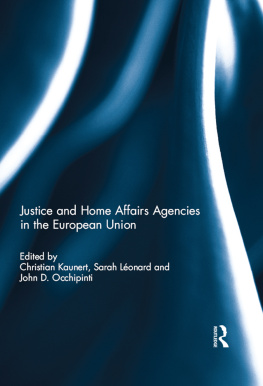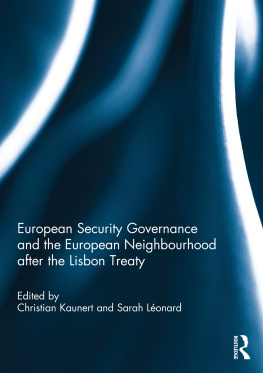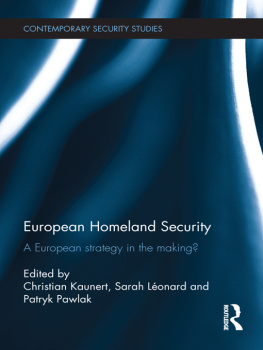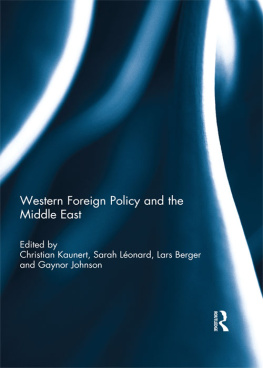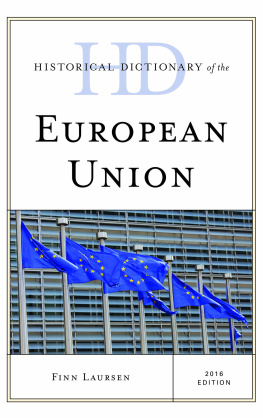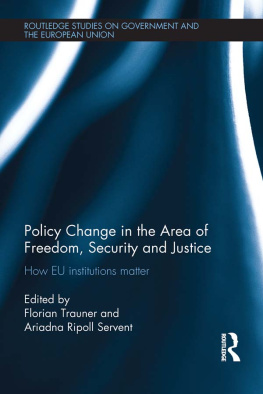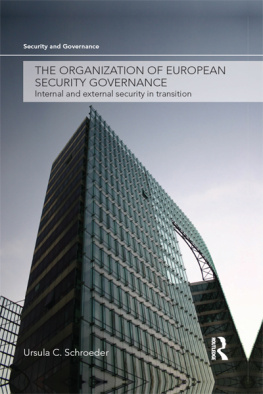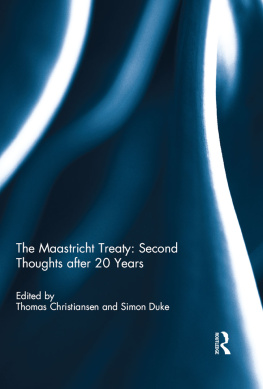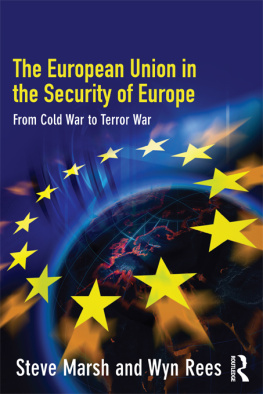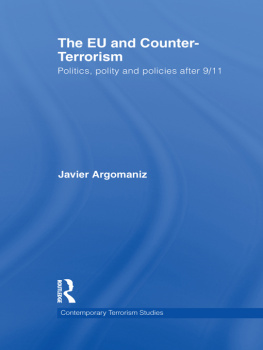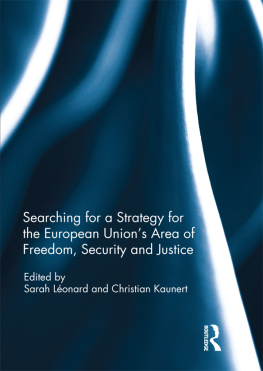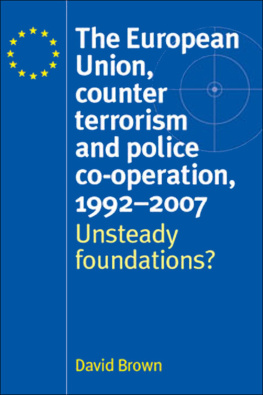Justice and Home Affairs Agencies in the European Union
This book examines the role of agencies and agency-like bodies in the EUs Area of Freedom, Security and Justice (AFSJ). When the Maastricht Treaty entered into force on 1 November 1993, the institutional landscape of the so-called Third Pillar looked significantly different than it does now. Aside from Europol, which existed only on paper at that time, the European agencies examined in this book were mere ideas in the heads of federalist dreamers or were not even contemplated. Eventually, Europol slowly emerged from its embryonic European Drugs Unit and became operational in 1999. Around the same time, the EU unveiled plans in its Tampere Programme for a more extensive legal and institutional infrastructure for internal security policies. Since then, as evidenced by the chapters presented in this book, numerous policy developments have taken place. Indeed, the agencies now operating in the AFSJ are remarkable in the burgeoning scope of their activities, as well as their gradually increasing autonomy vis--vis the EU member states and the institutions that brought them to life.
This book was originally published as a special issue of Perspectives on European Politics and Society.
Christian Kaunert is Professor of International Politics, as well as Jean Monnet Chair in EU Justice and Home Affairs Policy at the University of Dundee, Scotland, UK. He is Co-Director of the EUSA special interest section on the AFSJ.
Sarah Lonard is Senior Lecturer in Politics at the University of Dundee, Scotland, UK.
John D. Occhipinti is Professor of Political Science, Director of European Studies, and Departmental Chair at Canisius College, Buffalo, USA. He is Co-Director of the EUSA special interest section on the AFSJ.
Justice and Home Affairs Agencies in the European Union
Edited by
Christian Kaunert, Sarah Lonard and John D. Occhipinti
First published 2015
by Routledge
2 Park Square, Milton Park, Abingdon, Oxon, OX14 4RN, UK
and by Routledge
711 Third Avenue, New York, NY 10017, USA
Routledge is an imprint of the Taylor & Francis Group, an informa business
2015 Taylor & Francis
All rights reserved. No part of this book may be reprinted or reproduced or utilised in any form or by any electronic, mechanical, or other means, now known or hereafter invented, including photocopying and recording, or in any information storage or retrieval system, without permission in writing from the publishers.
Trademark notice: Product or corporate names may be trademarks or registered trademarks, and are used only for identification and explanation without intent to infringe.
British Library Cataloguing in Publication Data
A catalogue record for this book is available from the British Library
ISBN 13: 978-1-138-77955-6
Typeset in Times New Roman
by Taylor & Francis Books
Publishers Note
The publisher accepts responsibility for any inconsistencies that may have arisen during the conversion of this book from journal articles to book chapters, namely the possible inclusion of journal terminology.
Disclaimer
Every effort has been made to contact copyright holders for their permission to reprint material in this book. The publishers would be grateful to hear from any copyright holder who is not here acknowledged and will undertake to rectify any errors or omissions in future editions of this book.
Contents
Christian Kaunert, Sarah Lonard & John D. Occhipinti
Madalina Busuioc & Martijn Groenleer
Sarah Wolff & Adriaan Schout
Alex Mackenzie, Oldrich Bures, Christian Kaunert & Sarah Lonard
Jrg Monar
Helena Carrapio & Florian Trauner
Stephen Roze, Christian Kaunert & Sarah Lonard
Maia K. Davis Cross
The chapters in this book were originally published in Perspectives on European Politics and Society, volume 14, issue 3 (September 2013). When citing this material, please use the original page numbering for each article, as follows:
Chapter 1
Introduction: Agency Governance in the European Unions Area of Freedom, Security and Justice
Christian Kaunert, Sarah Lonard & John D. Occhipinti
Perspectives on European Politics and Society, volume 14, issue 3 (September 2013) pp. 273284
Chapter 2
Beyond Design: The Evolution ofEuropol and Eurojust
Madalina Busuioc & Martijn Groenleer
Perspectives on European Politics and Society, volume 14, issue 3 (September 2013) pp. 285304
Chapter 3
Frontex as Agency: More of the Same?
Sarah Wolff & Adriaan Schout
Perspectives on European Politics and Society, volume 14, issue 3 (September 2013) pp. 305324
Chapter 4
The European Union Counter-terrorism Coordinator and the External Dimension of the European Union Counter-terrorism Policy
Alex Mackenzie, Oldrich Bures, Christian Kaunert & Sarah Lonard
Perspectives on European Politics and Society, volume 14, issue 3 (September 2013) pp. 325338
Chapter 5
Eurojust and the European Public Prosecutor Perspective: From Cooperation to Integration in EU Criminal Justice?
Jrg Monar
Perspectives on European Politics and Society, volume 14, issue 3 (September 2013) pp. 339356
Chapter 6
Europol and its Influence on EU Policy-making on Organized Crime: Analyzing Governance Dynamics and Opportunities
Helena Carrapio & Florian Trauner
Perspectives on European Politics and Society, volume 14, issue 3 (September 2013) pp. 357371
Chapter 7
Is Europol a Comprehensive Policing Actor?
Stephen Roze, Christian Kaunert & Sarah Lonard
Perspectives on European Politics and Society, volume 14, issue 3 (September 2013) pp. 372387
Chapter 8
A European Transgovernmental Intelligence Network and the Role of IntCen
Maia K. Davis Cross
Perspectives on European Politics and Society, volume 14, issue 3 (September 2013) pp. 388402
Please direct any queries you may have about the citations to clsuk.permissions@cengage.com
CHRISTIAN KAUNERT*, SARAH LONARD* & JOHN D. OCCHIPINTI**
*School of Humanities, University of Dundee, Dundee, UK; **Canisius College, Department of Political Science, Buffalo, NY, USA
ABSTRACT This special issue examines the role of agencies and agency-like bodies in the EUs Area of Freedom, Security and Justice (AFSJ) an umbrella term for police and judicial cooperation, border management, asylum and migration, and counter-terrorism which have acquired increasing importance in the governance of the EU. This introduction reviews the existing literature and sets the scene for the research articles that are included in this special issue. It also argues that future scholarship on these AFSJ agencies would significantly gain by being developed along two research tracks. The first of these would investigate the forces that have led to the creation of these AFSJ agencies in the first place, especially because understanding these factors can shed significant light on where these agencies might be heading in future. The second research track would examine how legitimate each of these agencies is, as part of a would-be democratic polity at the EU level

